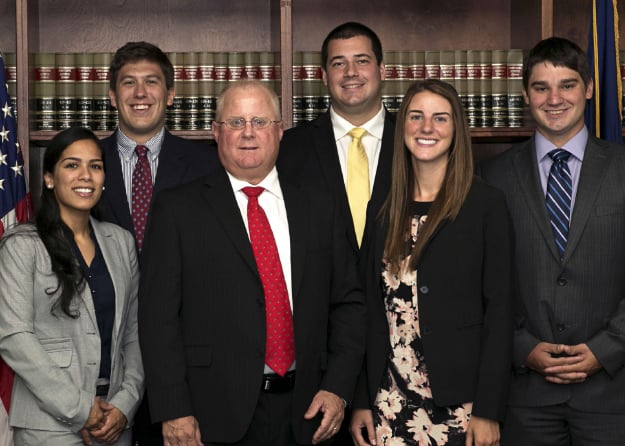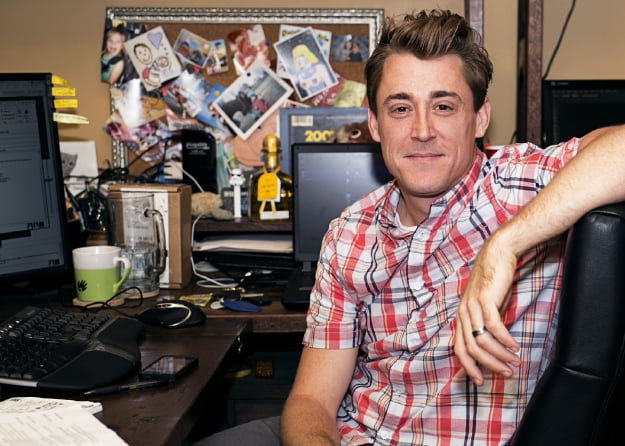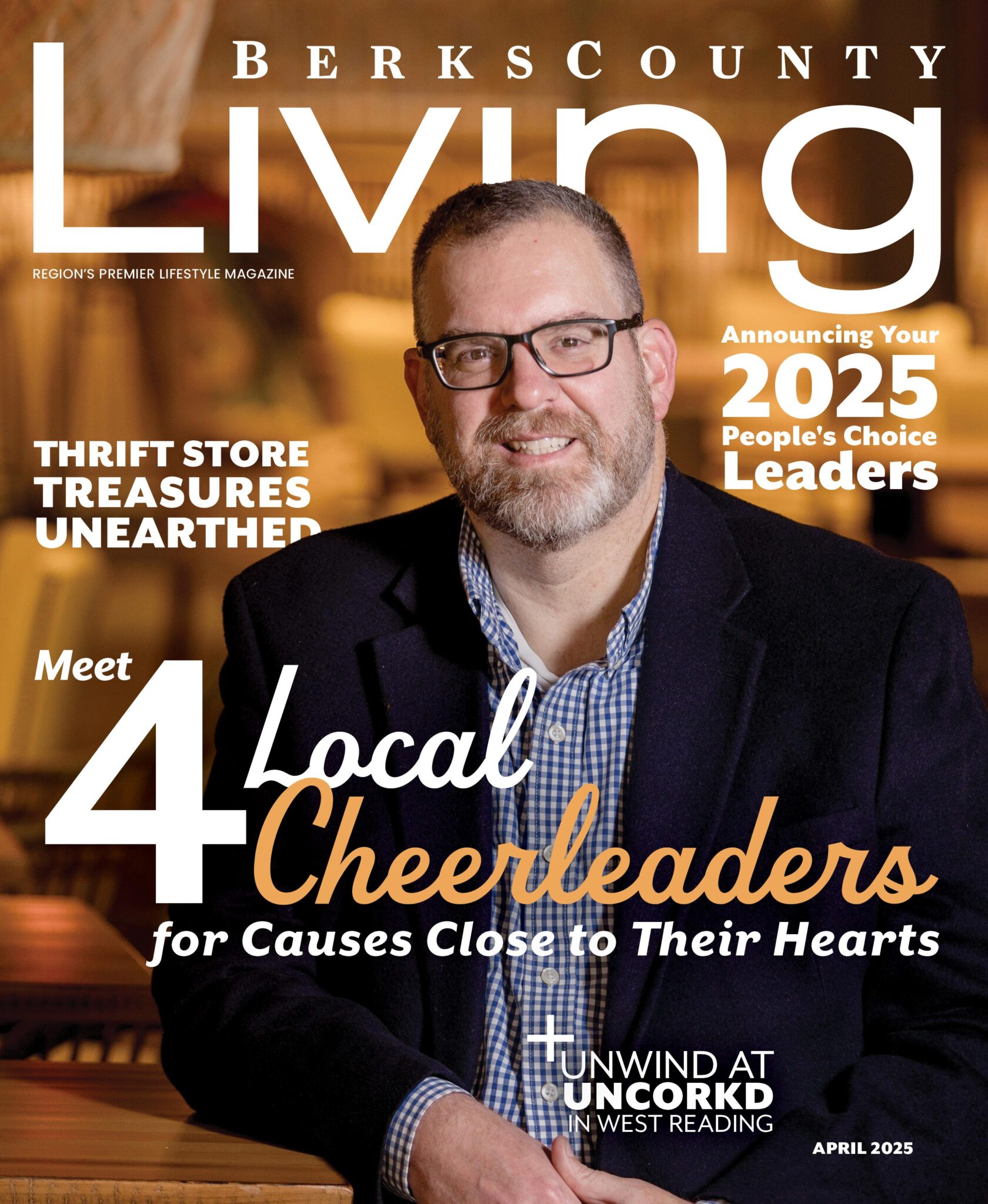
In the spotlight
A student hoping to snag an internship at SMG-managed Santander Arena once belted out a tune for Joanie Berney, while others only hinted at their performance aspirations. But working in the marketing department for the approximately 8,000-seat venue, as well as Santander Performing Arts Center and Reading Eagle Theater, doesn't amount to kicking back for a free concert every night or hobnobbing with famous singers, Berney warns.
She and her staff, including about five interns each year, put in long hours to promote top-notch acts. “There is no such thing as an average day,” Berney says, and her job sometimes demands an early breakfast meeting to announce an upcoming event and a late night working behind the scenes at a show, arranging meet-and-greets and escorting the media to the edge of the stage. “My job is definitely not 9 to 5, and no two days are the same. But when you enjoy your work, the days don't seem long,” Berney says.
Typically, Berney and her staff have 6-8 months to prepare for an event after an act is booked. Her interns do everything from keeping the monthly event schedule to creating promotional posters, monitoring social media and participating in conference calls to decide how to spend advertising dollars. “People need to get over that fear that interns only fetch coffee or make copies. I have my interns do real work,” Berney asserts.
“People need to get over that fear that interns only fetch coffee or make copies. I have my interns do real work,” Berney asserts.
Berney has mentored students from Penn State, Kutztown, Albright and Alvernia universities, to name a few, and that experience is priceless. Given the small staff, snagging an unpaid position doesn't usually lead to a full-time job there, but some former interns have gone on to work in other departments at the arena or parlayed the experience into a job in the field, like 2013 Penn State University graduate Samantha Trampe, who first met her future employer, Mills Entertainment, while immersing herself in the “Theresa Caputo Live” show. Bloomsburg University student Alyssa Blood spent her summer with Berney. “The hands-on experience as an intern is a lot more rewarding than learning about marketing in the classroom,” Blood explains, and the application “takes all of the classroom material to a whole new level.”
Since she started in 2005, four years after the arena opened its doors, Berney, a Mansfield graduate, has helmed promotions for dozens of shows. Over the years, changes in the economy, the popularity of social media, and the construction of new venues nearby has changed her marketing strategy.
Some of the most nerve-wracking moments happen in the hours leading up to the show.
One year, snowy New England weather snarled a Kenny Rogers show. Even though the skies were clear in Berks County, the singer elected to cancel his performance here and play the date to the north.
But Berney has seen performers rushed to the emergency room only to give a flawlessly energetic performance hours later. “You go with the flow and you just make the best of it,” Berney says.

Law and order
Interns in the Berks County District Attorney’s Office get first-hand experience helping authorities to investigate criminal activity, piecing together scenes through forensic evidence, or working with prosecutors to bring miscreants to justice.
Aspiring police officers work alongside the skilled and highly motivated local detectives as part of the criminal investigations internship for undergraduates, says Lieutenant Todd Trupp, shadowing investigators as they respond to emergency calls and unravel crimes as varied as child sexual abuse and fraud. “They go everywhere our detectives go, unless the area or residence is unsafe.” In the forensics lab, interns accompany detectives as they investigate everything from homicides to deadly car crashes. Those coveted lab spots are in short supply, as Berks County is one of only a handful of places across the country that offers chemists and other scientific students hands-on study in forensic services.
Candidates are vetted at least six months in advance. For law students, District Attorney John T. Adams and Chief Deputy District Attorney Jonathan H. Kurland provide guidance inside the courtroom and behind the scenes during painstaking trial preparations. First year law students are immersed in legal research projects and have the chance to observe court proceedings, but the Pennsylvania Supreme Court prohibits those students from practicing, Kurland says. His office also offers an internship for second-year students, who are legally certified to practice under the watchful eye of a pro. Over the summer the office hosted six interns, a critical part of finding and vetting future ADAs. “Our preference is to hire from our intern pool because it takes so much guesswork out of the hiring process,” Kurland says.
“Our preference is to hire from our intern pool because it takes so much guesswork out of the hiring process,” Kurland says.
His work days take him from behind the scenes in his office to the front lines of a crime scene. “One of the really fantastic things about a prosecution job is that there is no average day,” he says. “One day could involve being in the office preparing files and contacting witnesses and defense attorneys on the phones. Another day might involve working dozens of unrelated cases in a courtroom. Some days involve focusing on a hotly contested jury trial. Still other days might involve advising police or visiting a crime scene.” Some days are a combination of all five.
Internships play an important role for the intern as well as the District Attorney's staff, Kurland reveals. “We want every intern to be able get as much out of an experience with our office as they are willing to put into that experience.” And those unpaid work hours help set students apart when they're applying for work after graduation.
“We give certified interns a chance to work cases from day one,” Kurland said, from the first meeting with police and witnesses to discussions with defense attorneys and “quarterbacking hearings in court.” That experience is invaluable. “There is simply no substitute for the learning and growth that happens with the hands-on experience that a student gets from an internship.”
Karissa Rodriguez, a Temple University Beasley School of Law student slated to graduate in 2015, agrees. In the District Attorney's office she found mentors who let her sit second chair during trial and helped guide her through while fostering independence. “Their trust in me builds my confidence and allows me to shape the type of lawyer I want to be,” she says.

Intern abuser
Working at Neo-Pangea takes some serious creativity and artistic skill, but the self-serious need not apply. Members of the Society (as the employees are known) relish the fantastically absurd, from their trove of period garb — including wigs, fake mustaches and four industrial-grade clothing racks — to their Vine account paying homage to their dead goldfish and the critically acclaimed “Intern Abuser,” an interface that poked fun at the stereotype of the exploited free laborer by allowing Internet users to fire off Nerf darts and other forms of faux torture at their hapless intern Frank Marsters.
Owner Brett Bagenstose describes his motley crew as a firm “grown from a small experiment with a couple people working out of a living room to a band of misfits working with some of the most exciting entertainment brands in the country.” That long list includes creating apps, promotional movie tie-in micro-sites, and captivating, high-end interactive content for the likes of National Geographic, the Smithsonian, and the Discovery Channel. Bagenstose encourages his staff to experiment, maintaining side projects based on individual passions. That work may have applications for the business or lead to discoveries that can be applied to another project. “Every single project is unique, requires tons of research, and most importantly challenges us to evolve and break our own rules,” Bagenstose says. “We work hard, but there’s never a day without laughter erupting in every corner of the office.”
“Our interns have told us that they’ve learned more in a few weeks here than in their four years in school,” Bagenstose adds.
The same rules apply to interns. “They are invited to brainstorm, collaborate and integrate themselves as deeply as the rest of us,” Bagenstose says. Of the dozens of interns he's hosted since launching in 2005, some of the most driven went on to work for the firm after graduation. Finding the tenacity is up to the individual. “They really get to choose their own fate,” Bagenstose explains. “Most of them went on to become professionals in the industry; the rest were fed to our tiger.”
Marsters managed to avoid that fate, volunteering to be the focus of the “Intern Abuser” project, which raised some money in donations toward Marsters’ tuition as nearly 20,000 viewers from 67 countries fired off 5,500 Nerf darts in just 20 hours. The idea started in Bagenstose's living room, when staffer Jason Morris wanted to research robotics and the idea of merging the real world and digital gaming. “We realized that we could bestow our love of practical jokes onto the world,” Bagenstose says, eventually landing the “Nerd Rockstars” at the West Reading company in competition with respected Goliaths like Atari at SXSW.
“It was a massive kickstart to my career,” says Marsters, who returned to Neo-Pangea as a freelancer after graduating from Kutztown University in 2012, working on “some totally killer projects” including doing illustrations for the Smithsonian Channel's Rise of the Robots, which ended up in the Smithsonian Air and Space Museum in D.C.
“Our interns have told us that they’ve learned more in a few weeks here than in their four years in school,” Bagenstose adds. “We demand a level of professional product that can’t be rushed and must be thought through.”
by Kristin Baver | photos by Joanna Blessing
















